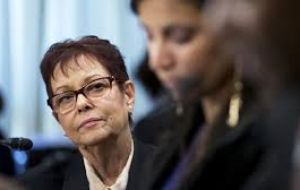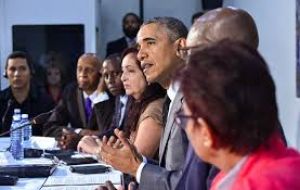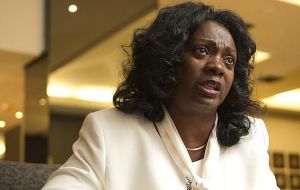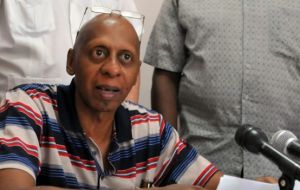MercoPress. South Atlantic News Agency
Cuban dissidents meet for almost two hours with Obama, including some critical of US policy
 “We thought it would be a half-hour meeting, and it was an hour and 45 minutes,” said Elizardo Sánchez, head of Human Rights and National Reconciliation.
“We thought it would be a half-hour meeting, and it was an hour and 45 minutes,” said Elizardo Sánchez, head of Human Rights and National Reconciliation.  “I think the most important thing of the meeting was the meeting itself,” said Miriam Leiva, an independent journalist and a founder of the Ladies in White
“I think the most important thing of the meeting was the meeting itself,” said Miriam Leiva, an independent journalist and a founder of the Ladies in White  Leiva said Obama “expressed a recognition to the opposition publicly” at his news conference on Monday and again on Tuesday in his speech to the Cuban people.
Leiva said Obama “expressed a recognition to the opposition publicly” at his news conference on Monday and again on Tuesday in his speech to the Cuban people.  “As far as I am concerned nothing has changed, the repression continues,” said Berta Soler from the Ladies in White group, who also met Obama at the embassy.
“As far as I am concerned nothing has changed, the repression continues,” said Berta Soler from the Ladies in White group, who also met Obama at the embassy.  Sánchez said Obama asked him if he had a list of political prisoners. ‘Yes, I have the list,’ Sánchez said he told the president. “So I gave it to him”
Sánchez said Obama asked him if he had a list of political prisoners. ‘Yes, I have the list,’ Sánchez said he told the president. “So I gave it to him”  Other dissidents who attended the meeting included Guillermo Fariñas, an activist from Santa Clara, Cuba, known for going on hunger strikes
Other dissidents who attended the meeting included Guillermo Fariñas, an activist from Santa Clara, Cuba, known for going on hunger strikes Leading Cuban dissidents, including some who have been critical of president Barack Obama's policy of engaging with the Cuban government, spent nearly two hours on Tuesday discussing human rights with the president at the US embassy. The frank meeting ended only when Obama’s aides ushered him out to reach the Estadio Latinoamericano in time for the first pitch of the Cuban national baseball team's game against the Tampa Bay Rays.
“We thought it would be a half-hour meeting, and it was an hour and 45 minutes,” said Elizardo Sánchez, the head of the Cuban Commission for Human Rights and National Reconciliation. He said Mr. Obama had listened to criticism from some of the 13 dissidents in attendance. “It was an atmosphere of closeness and trust,” he said.
Other activists who participated in the meeting at the embassy praised Obama for taking time during his visit to Cuba to hear them out.
“I think the most important thing of the meeting was the meeting itself,” said Miriam Leiva, an independent journalist and a founder of the Ladies in White, an opposition group. She noted that no head of state who has visited Cuba had met with prominent dissidents, “not even the popes.”
She added that the president had “expressed a recognition to the opposition publicly” at his news conference on Monday with president Raul Castro and again on Tuesday in his keynote speech to the Cuban people.
“That was transmitted live,” Ms. Leiva said. “The people of Cuba could hear it. They heard his concepts and heard him explain concepts of human rights and the possibility that Cubans could exercise their rights as well.”
Several Cubans opposed to the government tried to do exactly that on Tuesday, said José Daniel Ferrer, the leader of the Patriotic Union of Cuba, who attended the meeting with the president. Ferrer said demonstrators in Havana assembled after the president’s speech to demand the rights Obama had enunciated. When the police carried them off, dozens of other people protested, he said.
“This was spontaneous. It was not planned,” Ferrer added. “This posture he has taken, the solidarity he has shown, will help us a lot. He is already helping us.”
“As far as I am concerned nothing has changed, the repression continues,” said Berta Soler from the Ladies in White group, who met Obama at the embassy.
Other dissidents who attended the meeting with Obama included Dagoberto Valdes, a lay leader in the Roman Catholic Church; Guillermo Fariñas, an activist from Santa Clara, Cuba, known for going on hunger strikes; Juana Mora, a gay rights advocate; and Berta Soler, a founder of the Ladies in White, whose weekly protest on Sunday was disrupted when dozens of participants were arrested.
Sánchez, of the Cuban Commission on for Human Rights, said Mr. Obama asked him if he had a list of political prisoners. ‘Yes, I have the list,’ Sánchez said he told the president. “So I gave it to him. I guess they will find Mr. Acosta and pass it on.”
By the commission’s count, Cuba has 89 political prisoners, including 11 who have been given suspended sentences. An additional 20 or so are pending trial. Seven prisoners have been accused of violence or taking up arms against the government and are sometimes not counted because they are not “prisoners of conscience,” Sánchez said.
The White House revealed the meeting was a prerequisite for Obama in coming to Cuba. The Raul Castro government dismisses the dissidents as mercenaries without public support.




Top Comments
Disclaimer & comment rulesCommenting for this story is now closed.
If you have a Facebook account, become a fan and comment on our Facebook Page!